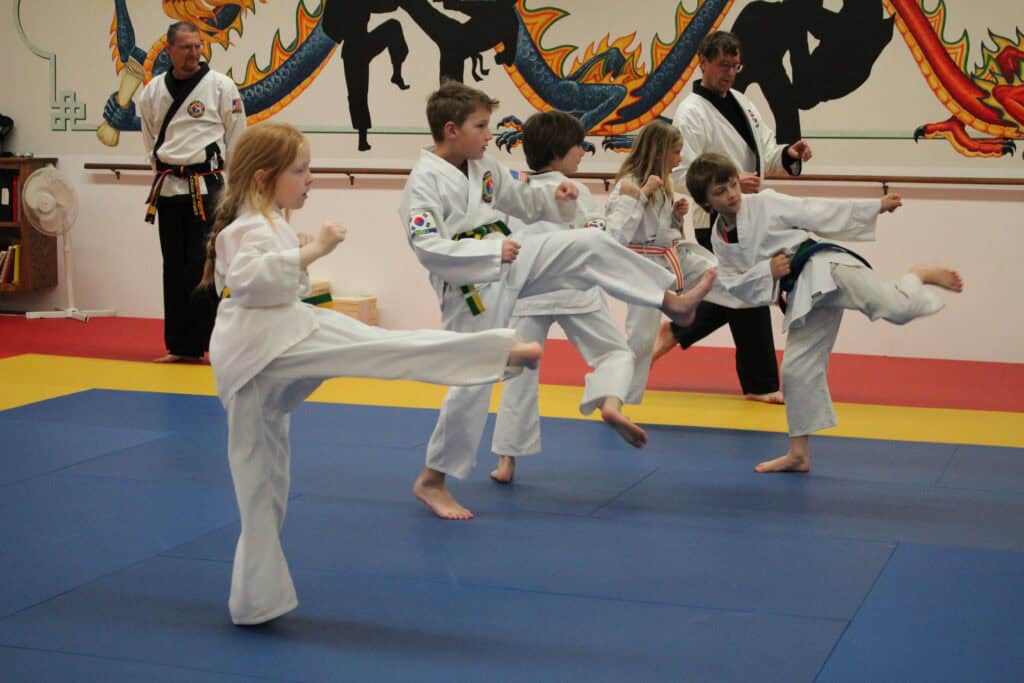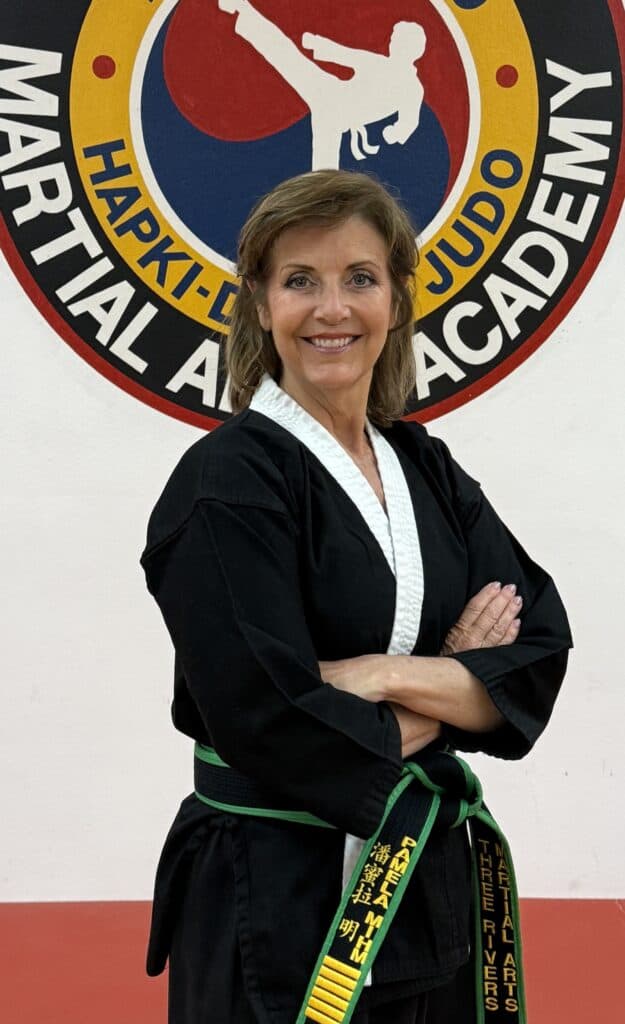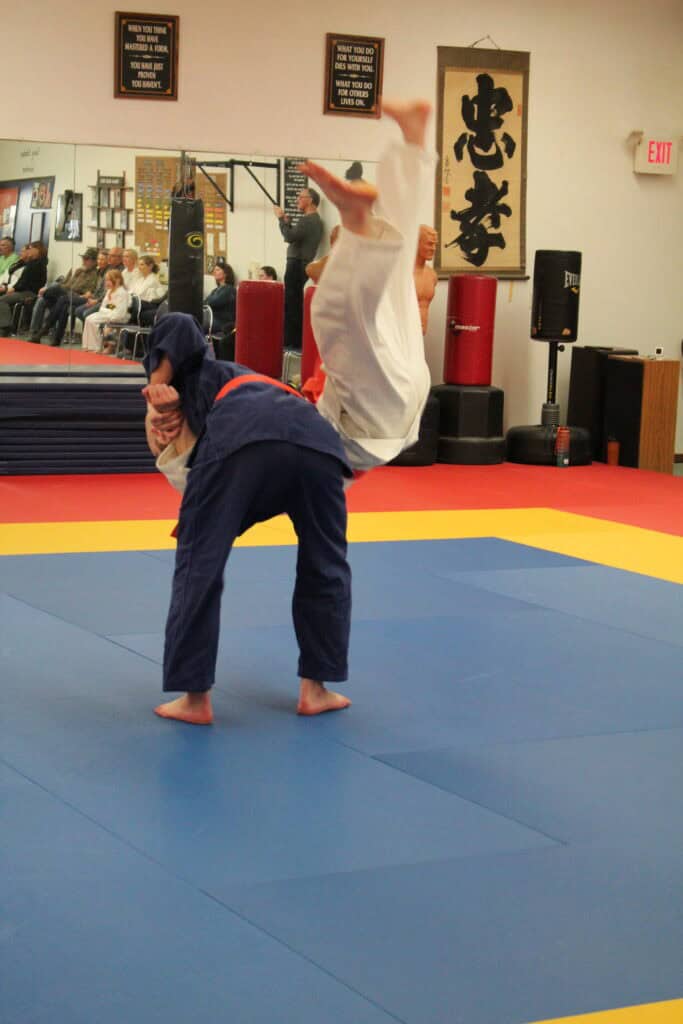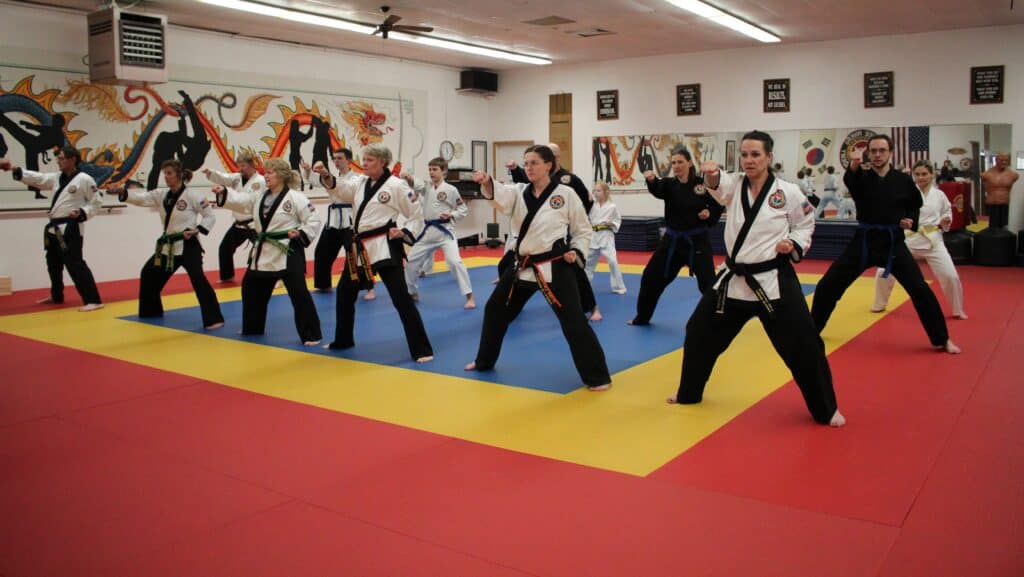
June 23, 2025
LA CROSSE – Though it started as an outgrowth of the popularity of martial arts thanks to Chuck Norris, Jackie Chan and others, Pamela Mihm – owner/director of the academy and a sixth-degree black belt – said Three Rivers Martial Arts Academy evolved to embrace the history and traditions on which martial arts were established.
Today, Mihm said the academy – located at 123 6th St. in La Crosse – teaches students through long-standing tenets of courtesy, humility, integrity, perseverance, self-control and indomitable spirit.
“People found more substance in learning the martial arts (recognizing) they aren’t just there to fight,” she said. “When you try to live by these tenets, people find meaning in their lives.”
That’s not to say the self-defense aspect of their martial arts has gone to the wayside.
Mihm said the academy has embraced the self-defense aspect of martial arts as an opportunity for personal and spiritual growth alongside the physical.
She said that was quickly apparent when she walked into the studio nearly 40 years ago with her brother to support his interest in pursuing the martial arts – she never left.
“It was so zen,” she said. “We both signed up that day, and when I earned my white belt, I thought, ‘I’m never going to be done with this, as it’s the most incredible thing.’”

Though a part of martial arts is about the physical, Mihm said it extends far beyond kicks and punches.
“Yes, you learn physical things, but you learn routines called forms, and with each rank, you’re given a new form to learn that is a series of movements and the meaning of that form,” she said. “There is an ancient warrior the form is about, honoring his life. That’s why we teach and learn the Korean language in an environment of respect. I found it so satisfying and fulfilling that I didn’t want to stop.”
Mihm said she hasn’t stopped yet.
A long-standing passion
When she was a student – where she ultimately earned her black belt – Mihm said the academy (which got its start in 1975) was owned by Larry Klahn and his partner, Ferdinand Roth, until Klahn’s death in 2021.
Klahn – who also had a background in law enforcement – Mihm said, was the “100% on-site guy,” managing the studio on a day-to-day basis, while Roth, a law enforcement officer, taught classes at the studio around his job.
Over time, Mihm said as the academy moved away from its trend-inspired start – embracing more traditional elements and the discipline, history, respect and legends of the art – Klahn began collecting Japanese Samurai swords forged over fire, and the academy joined the American Kyukido Federation.
“Federations were popping up all over the country as (those) trained in martial arts in Asian countries began teaching here,” she said.
As part of the federation, Mihm said students began finding more “substance” in the martial arts beyond the physical aspects.
“It was about being somebody inside and out, as we set standards that our students aspired to – tenets they were required to learn and stand by even today: courtesy, humility, integrity, perseverance, self-control and indomitable spirit,” she said.
The belts earned along an individual’s martial arts journey, Mihm said, hold meaning as well – white = purity, green = growth, blue = open sky and so forth – giving martial arts a depth not often seen in other sports.
“You can find connection and meaning in yourself here,” she said. “It’s why when people find this, they never leave. We have people who have been here for 40-50 years… They’re in a community where everybody gets so much internal satisfaction.”
Mihm said the academy thrived under Klahn’s daily oversight until he became ill and ultimately passed away.
She said his death prompted the academy’s five black-belt instructors – one being her – to come together to determine if and how the academy could move forward.

Mihm said they determined the studio was far too important to them, and that they “could not let it die.”
“We said, ‘Let’s see what we can do,’ pulled together and each took on a class one day per week and put a lot of elbow grease into the place,” she said.
By the end of 2022, Mihm said she purchased the academy.
“It made sense, as I’m the only one of the black belts with a business degree,” she said.
Though enrollment declined significantly due to the COVID-19 pandemic, Mihm said she did whatever she could to position the studio as a sanctuary for those seeking strength, discipline and personal empowerment through the time-honored tradition of martial arts.
“We’re not a tournament school,” she said. “We welcome students of all ages to walk the path of the warrior rooted in ancient wisdom and practical self-defense.”
Through a mix of Google Business applications, direct mailings, restaurant advertising and good old word of mouth, Mihm said the academy rebounded and now has about 60 students.
Going strong
Between the academy’s students and instructors, Mihm said there are 15 black belts ranging from first degree to seventh degree today.
She said Three Rivers Martial Arts Academy hosts about 16 classes per week – including Little Dragons (for ages 4-7) and a variety of adult and teen martial arts classes, ranging in difficulty depending on belt level.
In addition, Mihm said the academy hosts a Zumba class and a MoveNat class, which encourages natural movement.
Among the most popular offerings, she said, is W.I.S.E. – women initiating safe environments – an eight-week self-defense program that teaches not only self-defense but also workplace safety, car safety, home safety and both setting and keeping boundaries.
“It’s really important to manage fear or stress and be able to recall the things they’re taught in the class,” she said. “The yell often gets ‘trained out of women,’ and we get deep to wherever that emotion is and get that out.”
Mihm said she also began including trauma counselors in every class, because the nature of the work can be triggering.
For example, she said if a participant was in an abusive situation or experienced other trauma in the past, the trauma counselors can support students during difficult moments.
“Our goal is to get them past traumas and through to empowerment,” she said.
Mihm said the majority of the academy’s students are children.
“I think adults tend to think that once they’re past a certain age, they can’t learn new things or their bodies aren’t up for it anymore,” she said. “But if they just gave it a shot, they would see there’s more to it than just the physical side.”

Just last month, Mihm said she had a 55-year-old student begin his martial arts journey – noting it is an example that starting martial arts can occur most anytime.
“It’s just a matter of if you’re open to it,” she said. “We work with everybody’s abilities – you do what you can do while learning to protect yourself and embracing the tenets. We are often focused on centering that has nothing to do with physical skills.”
Reputation, foundation
The building Three Rivers Martial Arts Academy has called home for more than 30 years, Mihm said, is between 2,000 and 2,500 square feet – which is mostly comprised of a big open space, student lounge and a seating area.
The 50-year-old academy, she said, is well respected in the community thanks to the reputation Klahn and Roth established early on.
With Roth’s connection to law enforcement, Mihm said several law enforcement officers came to the studio in the 1980s to be trained and went on to earn their black belts.
“Martial arts and practical application go together,” she said.
Though the academy no longer officially helps train law enforcement officers, that foundation has most recently led it to offer martial arts trainings to corporations and municipalities.
Some trainings are one-time only for a few hours, she said, while others involve weekly sessions.
Collectively, Mihm said these newer offerings have introduced the martial arts to a broader audience.
Though she said she never intended to own a martial arts school, it seems like a full-circle journey.
“It’s something I love to do, and now is the perfect time of my life (to own the academy) because I love to teach,” she said. “I get to use my business degree, and it’s more natural for me to run the business, teach and keep working out and practicing my martial arts. It really is the best of both worlds.”
To help celebrate the academy’s 50 years of business, Mihm said they hosted an open house – allowing old, new and potential students to tour the facility, observe martial arts demonstrations and meet with instructors.
 Bassett Mechanical expands pipe fabrication capabilities
Bassett Mechanical expands pipe fabrication capabilities ‘Eat, drink, live’ – a toast to new beginnings for The Blind Horse
‘Eat, drink, live’ – a toast to new beginnings for The Blind Horse






